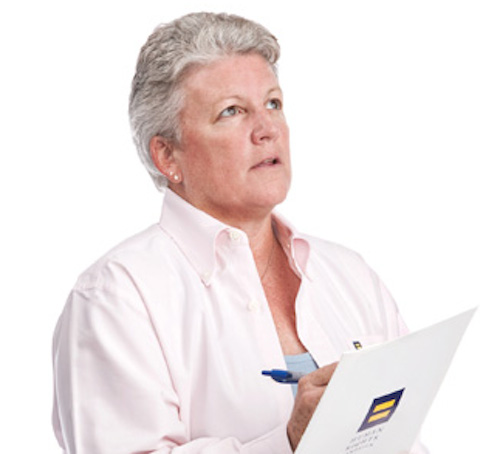In the fall of 2007, Congress was debating the Employment Non-Discrimination Act, a lynchpin in the LGBT civil rights agenda that would protect workers from losing jobs because of their sexual orientation. The mood in Washington was tense as lawmakers on both sides of the aisle argued the bill. Also at the table was the nation’s pre-eminent LGBT lobbying group, the Human Rights Campaign.
As support waned, the decision was made to remove transsexuals from those who would be covered by the act in order to get the bill through. In Austin, HRC governor and activist Jill Wilcox was devastated and on the verge of resigning her post. “I just felt like we had left the most vulnerable people in our community on the side of the road saying we’ll come back and get you later,” she says. “But I decided I would have a better chance to make a difference from the inside rather than the outside.”
At a governor’s meeting in Washington shortly after the bill failed, Wilcox stood up among 400 of her peers and asked if HRC would again support a bill that didn’t include transsexuals. The answer was no. The ENDA debacle was a teaching moment – and a testing one – for Wilcox and for HRC. “I came to understand the rationale behind the decision and learned that when it comes to laws, just like sausage, it’s best not to see how they’re made.”
Wilcox, a tech sector project manager who got her start in LGBT activism through bike rides for AIDS, moved to Austin in 1999. Attending an Austin Gay and Lesbian Film Festival party a couple years later, Wilcox met Earnest Morgan, who was at the time the production chair of the HRC Austin Gala. Morgan soon asked her to help him chair that year’s gala. “He saw me as a lesbian who is outgoing and he believed together we could bridge each others networks.”
Before she could say yes though, Wilcox asked her partner Karen Langsley (the two were married in Canada in 2008) and their two kids for their input. “I was happy to get involved, but I needed their blessings because this was going to be a big time commitment,” she says. “There’s no way that I could do the work that I do without the full support of my wife and kids.”
Wilcox was co-chair of the HRC black tie gala for three years and has been the co-chair of Austin’s Federal Club, HRC’s large donors group, since 2005. She’s a member of the local steering committee and has also been on the national board of governors for four years.
“Our biggest change has been the number of people involved,” she says. When Wilcox took over the local gala in 2002, the event drew 295 people. Her last gala as co-chair drew 600 attendees. The membership of Austin’s Federal Club has also doubled in the last four years and the number of governors Austin has at the federal level, which is based on the size of the local organization, has expanded from two to five.
“It’s interesting to be involved in a local organization with national influence,” she says. “It can be hard sometimes getting potential members to understand that things happening at the federal level affect us on the local level.”
HRC has a lot of issues at the top of its list. In a way, Wilcox argues, the conservative right has unwittingly helped set the agenda of groups like HRC by preemptively trying to curb the rights of the LGBT community. Those moves have prompted the debates over items such as the Defense of marriage act and ENDA, she says.
Despite her role, Wilcox says she’s never really thought of herself as an activist. “If people can get comfortable with who they are in their sub-community, where they live and work, it’s very easy to be active for whatever your cause is. I think it’s my job to be who I am. I’m a person who’s out at work, at my church, in the band boosters at our kids’ school. In a way, it’s unfortunate that just being who I am makes me an activist.”
So what is it that this lady is fighting for? Nothing short of eradicating the group she’s helping build. “When I started with HRC, I made it known that my whole objective was to never have to have a dinner. I want to make it so that it’s just not necessary anymore.” It’s a tall order – ending discrimination and realizing equality. But don’t tell Wilcox that.




































